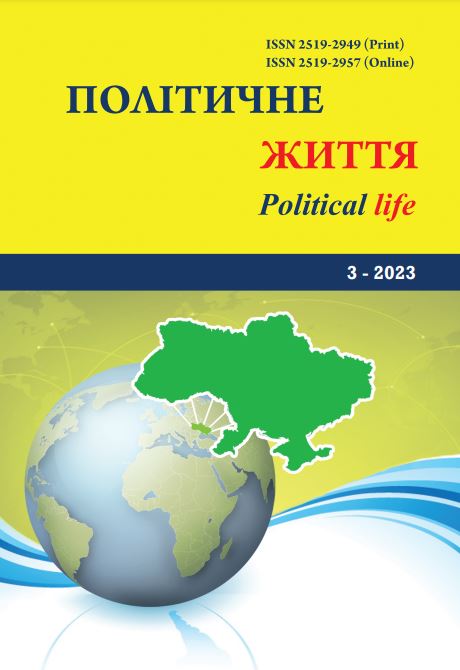Peculiarities of interpreting power through domination
DOI:
https://doi.org/10.31558/2519-2949.2023.3.1Keywords:
political power; domination; society; state; ideology; violence; hegemonyAbstract
The article examines the problem of interpreting power by explaining its phenomenon through dominance, manifested in supremacy, the subject’s monopoly on decision-making, as well as object control. In particular, attention is drawn to the fact that society cannot be without power as it resists anarchy, destruction, and the means by which political power exercises its will are authority, law and violence. It follows that, on the one hand, power is associated with coercion, force, and violence, and on the other, with consent, voluntary submission, and legitimacy. Special attention is paid to various differences in the image of political power, which imply the presence of two aspects in power relations: one consists in the compulsion to submit, and the other, on the contrary, in agreement with it.
An important problem that is also raised in the article is the identification of the close relationship between political power and violence, since it was born to solve the problems of security and state building and gradually acquired a monopoly on the use of violence, which became the most important tool of public administration. Also, in their research, the authors pay attention to various concepts of the interpretation of power, while special attention is paid to the Marxist doctrine of power and the influence of ideology on it.
The purpose of the study is to explore different approaches to understanding power through the prism of its influence on the processes of domination. Special emphasis is placed on the fact that today only a strong political power, guided by principles built on authority, influence and law, will be able to protect citizens and their interests. It is such a power that will be able to faithfully and legitimately make the right decisions and be responsible for their implementation.
References
Burdʹye P. Refleksyvna sotsiolohiya. K.: Meduza, 2015. 224 s.
Intentsii doslidzhennya sotsialʹnoy nerivnosti ta stratyfikatsii vid antychnosti do sʹohodennya. Hileya: scientific visnyk. 2020. Vyp. 157. S. 35-41.
Honcharuk-Cholach T., Huryk M., Dzhuhla N. Localisation of policy in the context of such scientific research. Hileya: scientific visnyk. 2022. Vyp. 167-168. S. 48-52.
Honcharuk-Cholach T., Dzhuhla N. Political sociology: a practical guide. Ternopilʹ: TNEU "Ekonomichna dumka", 2018. 234 s.
Hramshi A., Lukach D. Politykv nvuky. Yak keruvaty narodom. Kyiv, Dnipro: Batʹkivshchyna, 2020. 336 s.
History of economic vchenʹ: A navchalʹnyy posibnyk. Lviv: "New World - 2000", 2017. 436 s.
Althusser Louis On the Reproduction of Capital [1968 - 1980]. London: Verso, 2014. 345 s.
Elias N. Uber den Prozess der Zivilisation. Soziologenetische and psychogenetische Untersuchungen. Bd. I - II. Frankfurt am Maim. 1991.
Theodore R. S. Introduction: practice theory. The Practice Turn in Contemporary Theory. Taylor & Francis e-Library, 2015. P. 10-23.
Weber M. Das antike Judentum. Gesammelte Aufsatze zur Religionssoziologie. Bd. III. S. 415.
Weber M. Die Protestantische Ethik II. Kritiken und Antikritiken. Hg. V. J. Winckelmann. Munchen und Hamburg. 1968.
Weber M. Protestantische Ethik und der "Geist" des Kapitalismus. Archiv fur Sozialwissenschaft und Sozialpolitik, 1904 - 1905, Bd. 20 - 21.

